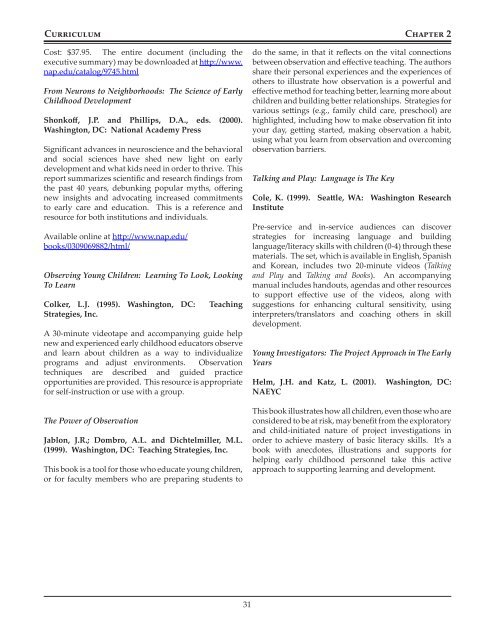Early Childhood
Early Childhood
Early Childhood
Create successful ePaper yourself
Turn your PDF publications into a flip-book with our unique Google optimized e-Paper software.
Curriculum Chapter 2<br />
Cost: $37.95. The entire document (including the<br />
executive summary) may be downloaded at http://www.<br />
nap.edu/catalog/9745.html<br />
From Neurons to Neighborhoods: The Science of <strong>Early</strong><br />
<strong>Childhood</strong> Development<br />
Shonkoff, J.P. and Phillips, D.A., eds. (2000).<br />
Washington, DC: National Academy Press<br />
Significant advances in neuroscience and the behavioral<br />
and social sciences have shed new light on early<br />
development and what kids need in order to thrive. This<br />
report summarizes scientific and research findings from<br />
the past 40 years, debunking popular myths, offering<br />
new insights and advocating increased commitments<br />
to early care and education. This is a reference and<br />
resource for both institutions and individuals.<br />
Available online at http://www.nap.edu/<br />
books/0309069882/html/<br />
Observing Young Children: Learning To Look, Looking<br />
To Learn<br />
Colker, L.J. (1995). Washington, DC: Teaching<br />
Strategies, Inc.<br />
A 30-minute videotape and accompanying guide help<br />
new and experienced early childhood educators observe<br />
and learn about children as a way to individualize<br />
programs and adjust environments. Observation<br />
techniques are described and guided practice<br />
opportunities are provided. This resource is appropriate<br />
for self-instruction or use with a group.<br />
The Power of Observation<br />
Jablon, J.R.; Dombro, A.L. and Dichtelmiller, M.L.<br />
(1999). Washington, DC: Teaching Strategies, Inc.<br />
This book is a tool for those who educate young children,<br />
or for faculty members who are preparing students to<br />
31<br />
do the same, in that it reflects on the vital connections<br />
between observation and effective teaching. The authors<br />
share their personal experiences and the experiences of<br />
others to illustrate how observation is a powerful and<br />
effective method for teaching better, learning more about<br />
children and building better relationships. Strategies for<br />
various settings (e.g., family child care, preschool) are<br />
highlighted, including how to make observation fit into<br />
your day, getting started, making observation a habit,<br />
using what you learn from observation and overcoming<br />
observation barriers.<br />
Talking and Play: Language is The Key<br />
Cole, K. (1999). Seattle, WA: Washington Research<br />
Institute<br />
Pre-service and in-service audiences can discover<br />
strategies for increasing language and building<br />
language/literacy skills with children (0-4) through these<br />
materials. The set, which is available in English, Spanish<br />
and Korean, includes two 20-minute videos (Talking<br />
and Play and Talking and Books). An accompanying<br />
manual includes handouts, agendas and other resources<br />
to support effective use of the videos, along with<br />
suggestions for enhancing cultural sensitivity, using<br />
interpreters/translators and coaching others in skill<br />
development.<br />
Young Investigators: The Project Approach in The <strong>Early</strong><br />
Years<br />
Helm, J.H. and Katz, L. (2001). Washington, DC:<br />
NAEYC<br />
This book illustrates how all children, even those who are<br />
considered to be at risk, may benefit from the exploratory<br />
and child-initiated nature of project investigations in<br />
order to achieve mastery of basic literacy skills. It’s a<br />
book with anecdotes, illustrations and supports for<br />
helping early childhood personnel take this active<br />
approach to supporting learning and development.


